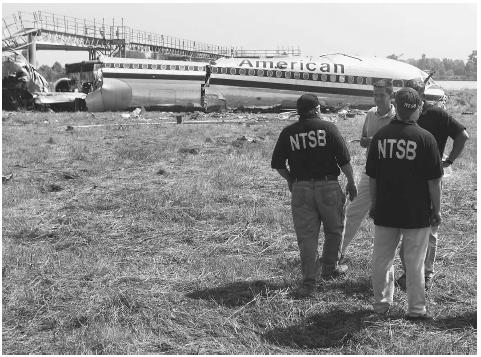NTSB (National Transportation Safety Board)
The United States National Transportation Safety Board (NTSB) is an independent national agency responsible for investigating transportation accidents within the United States. The agency has custody of all debris and wreckage

from accidents that it investigates, and thorough investigations sometimes take years to complete. The primary focus of NTSB operations is the investigation of civil aviation accidents, however the agency is also required to report on railroad, pipeline, and significant marine and highway accidents. For the NTSB to be involved in an accident investigation, the accident must involve a national transportation infrastructure, a public vessel, or hazardous materials.
The NTSB was established on April 1, 1967. In its early days, the agency worked closely with the Department of Transportation. Concerned with the NTSB's ties to the nation's transportation regulatory agency and the transportation industry, Congress sought to make the NTSB an independent, and impartial, entity. In 1975, the agency became independent, receiving funding in its own right through the Independent Safety Board Act.
The NTSB is managed by a five-person board. Members are appointed by the President to serve five-year terms. The board directs agency field investigators, and certifies final accident reports.
In addition to accident investigation, the NTSB maintains the government database of civil aviation accidents. The database permits NTSB researchers to search for patterns in accident occurrence, as well as publish safety statistics for carriers and airports. The NTSB conducts regular studies of transportation safety procedures, making improvement suggestions to transportation officials and Congress when necessary. Since its inception in 1967, the NTSB has issued nearly 12,000 recommendations. Though the NTSB does not have the power to act as a regulatory authority, most of its recommendations have been adopted by the national transportation industry.
The NTSB is also an instrument of national transportation law. The board sometimes hears the appeals of pilots, mechanics, and mariners who have been stripped of professional privileges, certificates, or incurred disciplinary fines. For advice on these cases, the NTSB employs legal council. Council is also provided to any witnesses or parties involved in an accident who are questioned by NTSB investigators.
Although the investigative jurisdiction of the NTSB does not extend beyond national borders, the agency provides investigators for international accidents involving United States registered aircraft or maritime vessels. United States NTSB investigators, or foreign NTSB Accredited Representatives, have occasionally been welcomed by foreign governments that do not have their own investigative services to report on accidents.
After the 2001 terrorist attacks on the United States, the NTSB began widespread investigations of the airlines' safety and screening procedures. The newly created Transportation Safety Administration temporarily assumed many of the NTSB safety recommendation duties. The NTSB continues to investigate the actual September 11, 2001, airline crashes associated with the terrorist attacks.
█ FURTHER READING:
ELECTRONIC:
United States National Transportation Safety Board. < http://www.ntsb.gov > (30 April 2003).
SEE ALSO
Airline Security
Aviation Security Screeners, United States
FAA (United States Federal Aviation Administration)
September 11 Terrorist Attacks on the United States
Comment about this article, ask questions, or add new information about this topic: